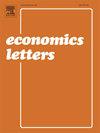影子银行与气候变化,绿色信贷风险政策的 "隐形树叶
IF 2.1
4区 经济学
Q2 ECONOMICS
引用次数: 0
摘要
本文研究了影子银行对传统银行信贷风险的两个重要绿色审慎提案:绿色支持因子(GSF)和棕色惩罚因子(BPF)效率的影响。本文通过一个环境一般均衡模型表明,在模型中没有影子银行的情况下,使用 BPF 或 GSF 会在银行稳定性和环境效益之间产生负相关关系。通过引入影子银行,使用 BPF 可以在保持银行稳定性的同时产生环境效益。这些结果表明,在对绿色信贷风险监管提案进行一致评估时,有必要将影子银行部门考虑在内。本文章由计算机程序翻译,如有差异,请以英文原文为准。
Shadow banking and climate change, the “hidden leaf” of green credit risk policy
The paper studies the influence of shadow banking on the efficiency of two important green prudential proposals for credit risk of traditional banks : the Green Supporting Factor (GSF) and the Brown Penalizing Factor (BPF). Through an environmental general equilibrium model, the paper shows that, without shadow banks in the model, the use of the BPF or GSF generates a negative relationship between banking stability and environmental benefits. By introducing shadow banks, the use of BPF allows to maintain banking stability and to generate environmental benefits at the same time. These results emphasize the need to take into account shadow banking sector in a consistent assessment of green credit risk regulation proposals.
求助全文
通过发布文献求助,成功后即可免费获取论文全文。
去求助
来源期刊

Economics Letters
ECONOMICS-
CiteScore
3.20
自引率
5.00%
发文量
348
审稿时长
30 days
期刊介绍:
Many economists today are concerned by the proliferation of journals and the concomitant labyrinth of research to be conquered in order to reach the specific information they require. To combat this tendency, Economics Letters has been conceived and designed outside the realm of the traditional economics journal. As a Letters Journal, it consists of concise communications (letters) that provide a means of rapid and efficient dissemination of new results, models and methods in all fields of economic research.
 求助内容:
求助内容: 应助结果提醒方式:
应助结果提醒方式:


